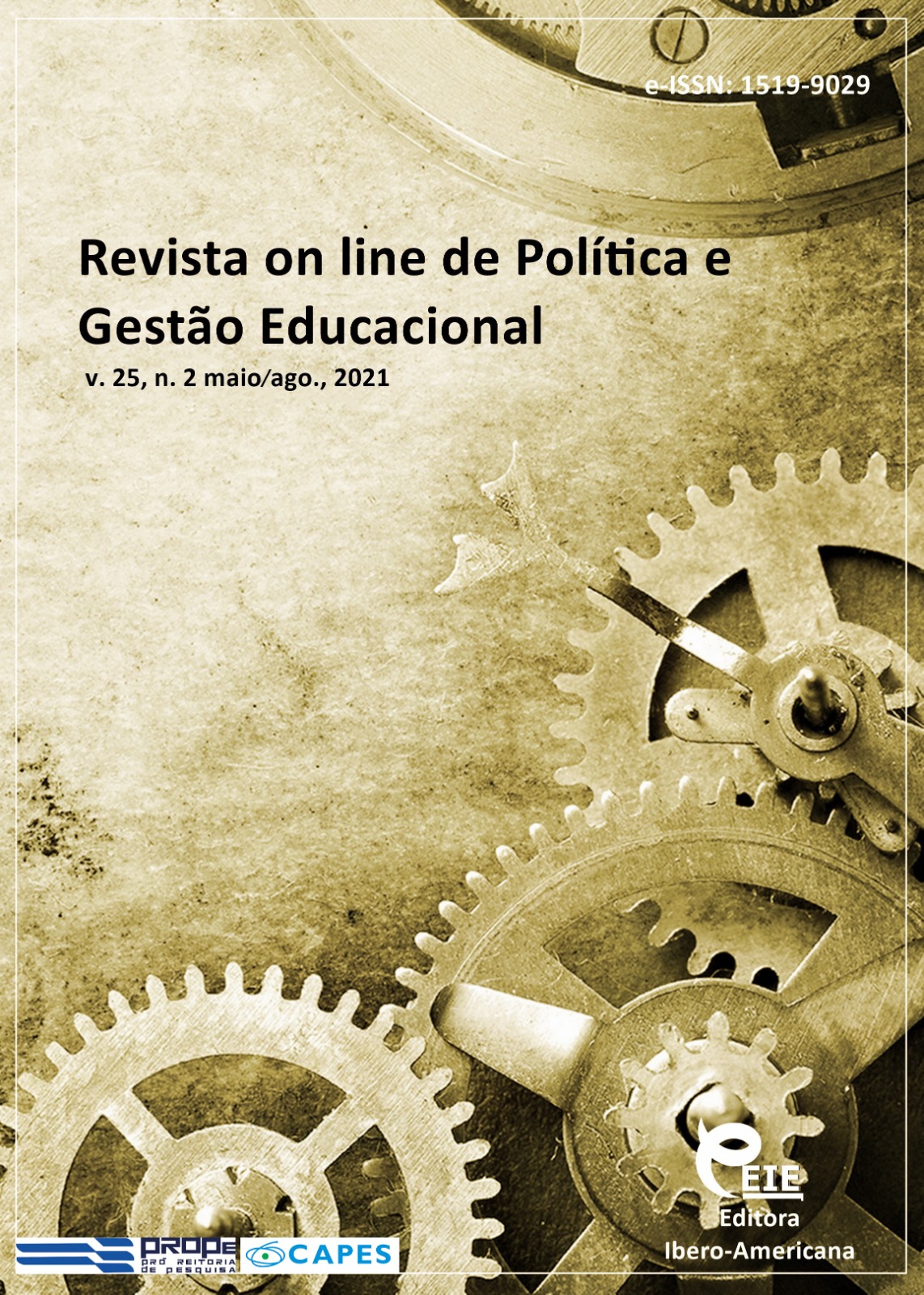Aplicação da habilidade de metacognição em métodos de solução de problemas para estudantes do ensino médio
DOI:
https://doi.org/10.22633/rpge.v25i2.15502Palavras-chave:
Habilidades metacognitivas, Problemas matemáticos, Alunos do ensino médioResumo
Atualmente, os formuladores de políticas em todo o mundo estão tentando reformar o sistema educacional em geral e a educação matemática em particular para criar uma mudança fundamental no conteúdo, no currículo e nos métodos de aprendizagem de matemática dos estudantes. Esforços inovadores na educação em Matemática concentram-se em ajudar os estudantes a desenvolver as competências centrais do século 21 para criar mais opções educacionais e de carreira para os estudantes no futuro. Metacognição ou pensar em pensar refere-se à capacidade de um indivíduo de controlar seus processos de pensamento, especialmente a percepção de escolher e usar estratégias de resolução de problemas. Para encontrar soluções para os problemas mencionados, vários estudos se concentraram na compreensão do papel da metacognição nas atividades de resolução de problemas no processo de ensino de Matemática. Neste estudo vamos explorar alguns modelos metacognitivos na educação matemática, por isso, pesquisamos “Aplicação da habilidade de metacognição em métodos de solução de problemas para estudantes do ensino médio”.
Downloads
Referências
BROWN, A. L. Knowing when, where, and how to remember; a problem of metacognition. Advances in İnstructional Psychology, v. 1, 1978.
FLAVELL, J. H. Metacognition and cognitive monitoring. A new area of cognitive-developmental inquiry. American Psychologist, v. 34, p. 906-911, 1979.
GARCÍA, T. et al. Elementary students’ metacognitive processes and post-performance calibration on mathematical problem-solving tasks. Metacognition and Learning, v. 11, n. 2, p. 139-170, 2016.
GAROFALO, J.; LESTER JR, F. K. Metacognition, cognitive monitoring, and mathematical performance. Journal for research in mathematics education, p. 163-176, 1985.
GHATALA, E. S. et al. A componential analysis of the effects of derived and supplied strategy-utility information on children's strategy selections. Journal of Experimental Child Psychology, v. 41, n. 1, p. 76-92, 1986.
GRİFFİN, P.; MCGAW, B.; CARE, E. Assessment and teaching of 21st century skills. Dordrecht: Springer, 2012.
HANG, N. T. et al. Educating and training labor force under Covid 19: Impacts to meet market demand in Vietnam during globalization and integration era. Journal for Educators, Teachers and Trainers, v. 12, n. 1, p. 78-89, 2021.
HOA, N. T. et al. Human resource for schools of politics and for international relation during globalization and EVFTA. Elementary education online, v. 20, n. 4, p. 23-43, 2021.
HOWARD, B. C. Metacognitive self-regulation and problem-solving: expanding the theory base through factor analysis. 2000.
HUY, D. T. N. et al. General Solutions for Enhancing Quality of Teachers During Globalization in Emerging Markets Including Vietnam - and Some Pedagogy Psychological Issues. Psychology and Education Journal, v. 58, n. 4, 2021.
HUY, D. T. N.; VAN, P. N.; HA, N. T. T. T. Education and computer skill enhancing for Vietnam laborers under industry 4.0 and evfta agreement. Elementary education online, v. 20, n. 4, p. 1033-1038, 2021.
JACOBSE, A. E.; HARSKAMP, E. G. Towards efficient measurement of metacognition in mathematical problem solving. Metacognition and Learning, v. 7, n. 2, p. 133-149, 2012.
JENSEN, T. H. Assessing mathematical modelling competency. Mathematical Modeling (ICTMA 12): Education, Engineering and Economics, p. 141-148, 2007.
KAPA, E. A metacognitive support during the process of problem solving in a computerized environment. Educational Studies in Mathematics, v. 47, n. 3, p. 317-336, 2001.
KRAMARSKİ, B. Promoting teachers’ algebraic reasoning and self-regulation with metacognitive guidance. Metacognition and Learning, v. 3, n. 2, p. 83-99, 2008.
KRULİK, S.; RUDNİCK, J. A. Problem solving: a handbook for teachers. Allyn and Bacon, Inc., 7 Wells Avenue, Newton, Massachusetts,1987).
KULM, G.; BUSSMANN, H. A phase-ability model of mathematics problem solving. Journal for Research in Mathematics Education, p. 179-189, 1980.
KUZLE, A. Assessing metacognition of grade 2 and grade 4 students using an adaptation of multi-method interview approach during mathematics problem-solving. Mathematics Education Research Journal, v. 30, n. 2, p. 185-207, 2018.
KUZLE, A. Preservice teachers' patterns of metacognitive behavior during mathematics problem solving in a dynamic geometry environment. 2011. Dissertation (Doctoral) – University of Georgia, 2011.
LESTER, F. K. Building bridges between psychological and mathematics education research on problem solving. 1982.
SİLVER, E. A. Knowledge organization and mathematical problem solving. Mathematical problem solving: Issues in research, p. 15-25, 1982.
TOBİAS, S.; EVERSON, H. T. Knowing what you know and what you don’t: further research on metacognitive knowledge monitoring. Technical Report 3, The College Board Research Report, 2002.
Downloads
Publicado
Como Citar
Edição
Seção
Licença
Copyright (c) 2021 Revista on line de Política e Gestão Educacional

Este trabalho está licenciado sob uma licença Creative Commons Attribution-NonCommercial-ShareAlike 4.0 International License.
Manuscritos aceitos e publicados são de propriedade da Revista on line de Política e Gestão Educacional. É vedada a submissão integral ou parcial do manuscrito a qualquer outro periódico. A responsabilidade do conteúdo dos artigos é exclusiva dos autores. É vedada a tradução para outro idioma sem a autorização escrita do Editor ouvida a Comissão Editorial Científica.











